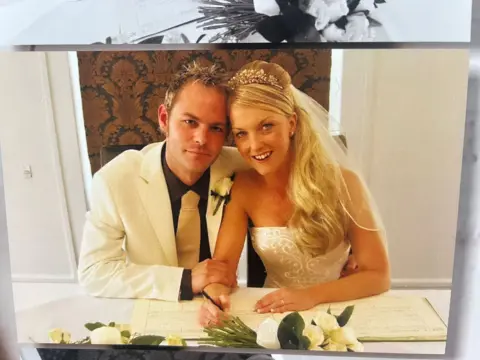Mother died after hysterectomy in private hospital
 Family handout
Family handoutNeglect at a private hospital contributed to the "avoidable" death of a 48-year-old woman, an inquest has found.
Maxine Spittlehouse underwent a hysterectomy at Kinvara Private Hospital in Rotherham, and despite "obvious" internal bleeding in the hours afterwards, was not transferred to NHS care in time to save her.
Her husband, David Spittlehouse, said: "All the symptoms were there to be seen and acted on. She was failed by those responsible for her care."
He said private hospitals like Kinvara, which has not responded to the BBC's requests for a statement, should not be permitted to carry out total abdominal hysterectomies.
"She would want us to get justice, I know she would. If it were other way round and that had happened to me, she would have gone hell for leather," he said.
Mrs Spittlehouse was an NHS patient, and chose Kinvara for the hysterectomy on 16 July 2024. The procedure had been advised to treat her heavy and painful periods.
The doctors who performed the surgery on her checked and found no bleeding as a result of the operation, which was described in notes as "straightforward", but the seals must have failed after their checks, Doncaster Coroner's Court heard.
 family handout
family handoutAlmost immediately after the procedure, at about 13:00 BST, Mrs Spittlehouse had severe abdominal pain.
By 01:00 BST she was "screaming in pain", vomiting, pale and unable to lie down.
The "obvious" risk of internal bleeding was not established by the doctor treating her and was deemed a "gross failure" by assistant coroner Georgina Gibbs.
Nurses raised concerns at least three times and, at about 01:45, first suggested to the junior doctor she should be transferred to emergency care.
"Although he said, 'leave it with me', nothing did happen in that particular regard until over five hours later," the coroner said.
By 03:20, Mrs Spittlehouse was in "a very precarious position", the coroner said, and despite one nurse "constantly" informing the doctor of this, it would be another four hours before an ambulance was called.
The inquest heard Dr Mandela Thyoka had considered whether Mrs Spittlehouse's reaction was "related to her pain threshold".
"By now, it was a clear and obvious risk, beyond mere possibility that she may be experiencing internal bleeding," Ms Gibbs said.
"I consider [Dr Thyoka] had not realised the gravity of the situation. While he was trying to administer care to Maxine, it was not the right care."
The doctor told the inquest he should have called the senior consultant at 01:45 on reflection. This did not happen until 05:00, after he had been on shift for 20 hours.
The coroner said Maxine was "entitled to receive the same standard of care whatever the time, day or night," and noted NHS doctors are not allowed to work longer shifts than 12 hours, unless in an emergency.
'How much worse did it need to be?'
At about 05:00 BST, Dr Thyoka called Dr Indranil Dutta, consultant gynaecologist, and told him: "She's not looking too great, I can't put my finger on it – I don't think she's internally bleeding".
Dr Dutta told the coroner he did not think it was an emergency, and he had not been told of the nurses' concerns.
Ms Gibbs said: "It was not for the highly experienced consultant to be reassured by the junior doctor in circumstances where it was clear he did not understand what the cause was."
Dr Dutta told the inquest he had given an instruction to transfer her to Rotherham Hospital immediately, but the coroner said he "may have misremembered".
"If it was a risk, and with time being ever critical, he should have transferred her straight away," she said.
"How much worse did it need to be? What else needed to happen before she would be transferred? He knew Kinvara was not equipped to deal with such a situation."
He left the hospital at 06:50, and told the inquest he did "all he could do".
At about 07:15, Dr Thyoka made a decision to call an ambulance, but without conveying the urgency of the situation, was told it could be a two-hour wait.
Fifteen minutes later, Mrs Spittlehouse was "tragically at the point of no return", the coroner said, and by 07:40 she had "completely shut down".
She suffered a cardiac arrest and while in theatre at Rotherham Hospital, large blood clots and uterine bleeding were found.
 family handout
family handoutThe Spittlehouses' only child, Millie, 24, said she had put trust in the people caring for her mother.
"You think because it's a hospital, it's safe and it's fine, but sometimes that's not the case."
She said she "gets her strength" from Mrs Spittlehouse.
"She was a strong lady. Whenever I feel upset, I can always feel her."
Speaking after the inquest, she said: "Mum lived life to the fullest.
"She could make friends with anyone and lit up every room with her kindness, positivity and humour.
"We loved her so very much and our lives will not be the same without her."
Mrs Spittlehouse passed away on 22 July due to a hypoxic brain injury caused by post-operative bleeding.
The coroner said: "Some failures were admitted by Dr Thyoka, none were admitted by anyone else.
"In this case there were a number of shortcomings and negligence.
"There were no real means of dealing with the emergency at Kinvara and she should have been transferred.
"Her death was an avoidable death. I do find that the high threshold of neglect is made out in this case."
Kinvara Private Hospital has been contacted for comment.
Listen to highlights from South Yorkshire on BBC Sounds, catch up with the latest episode of Look North
